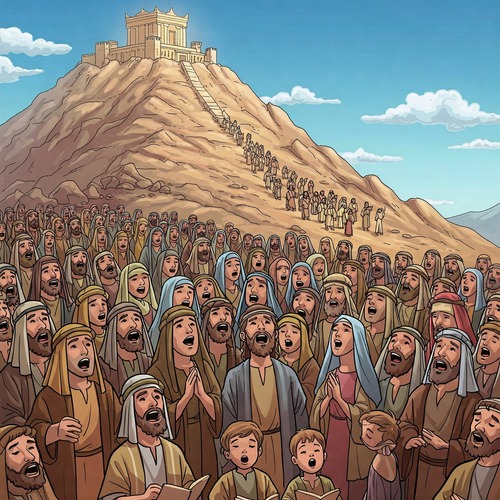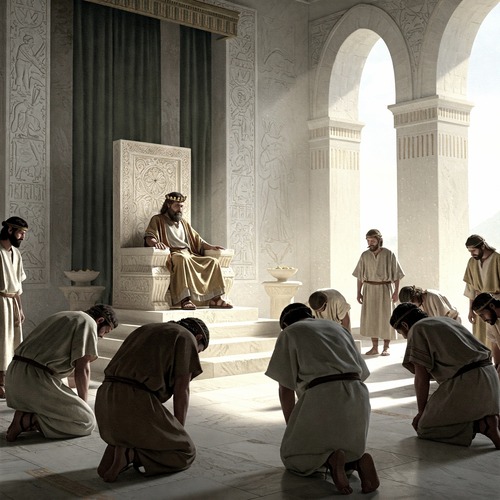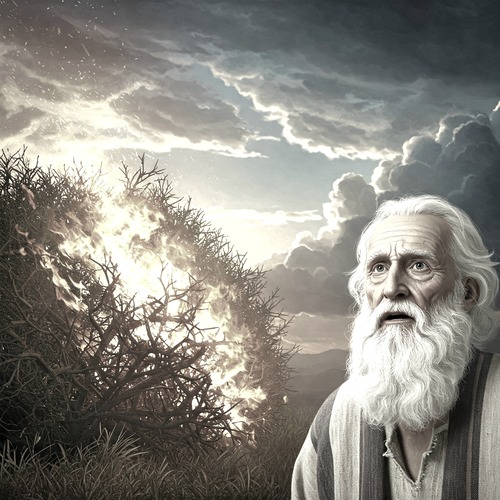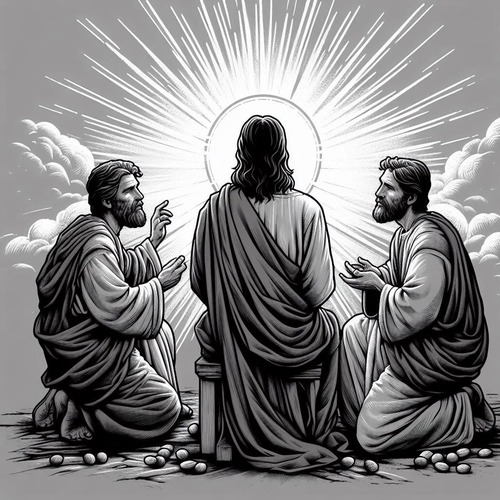Jephthah’s Vow: If God Is Love, Why Didn’t He Intervene?
The story is haunting. Jephthah, desperate for victory against Israel’s enemies, makes a reckless vow to God: “Whatever comes out of my house to meet me when I return in triumph from the Ammonites will be the LORD’s, and I will sacrifice it as a burnt offering” (Judges 11:31). He wins the battle. His daughter runs out to greet him. And then, the unthinkable happens…
Where was God? Why didn’t He stop the tragedy? If God truly loves His people, how could He let an innocent girl die for her father’s foolish promise?
SCRIPTURE RECORDS THE STORY, BUT DOES NOT ENDORSE IT
First, we must remember the Bible often describes events without approving them. The book of Judges repeatedly shows us the moral chaos of a nation that had abandoned God’s ways. The narrator’s verdict echoes throughout: “In those days Israel had no king; everyone did as they saw fit” (Judges 21:25).
Jephthah’s vow wasn’t commanded by God—it was the desperate gamble of a man shaped by pagan culture. Ancient Near Eastern warfare often involved such rash promises to the gods. But Israel’s God had already given clear commands against child sacrifice, calling it “detestable” (Deuteronomy 12:31). The tragedy reveals human folly, not divine approval.
Scripture records Jephthah’s story to show us where religious zeal without wisdom leads. God used a flawed man to deliver Israel, but that doesn’t mean He endorsed every aspect of Jephthah’s character or choices.
THE MYSTERY OF DIVINE PERMISSION
But why didn’t God intervene? The question touches one of theology’s deepest mysteries: how a sovereign God relates to human freedom and responsibility.
Reformed thinkers distinguish between God’s directive will (what He commands) and His permissive will (what He allows). God never commanded Jephthah’s vow, but He permitted it within His larger purposes. This doesn’t make God the author of the tragedy—human sin and folly bear that responsibility.
We see the pattern throughout Scripture. God permitted David’s adultery and murder, Joseph’s brothers’ betrayal, and Judas’ betrayal of Christ. In each case, human evil was real and culpable, yet God wove these dark threads into His larger tapestry of redemption.
Why does God sometimes restrain evil and sometimes permit it? Scripture doesn’t give us a complete answer. What it does tell us is God’s ways are higher than our ways (Isaiah 55:8-9), and that He works all things—even the worst human failures—together for good for those who love Him (Romans 8:28).
LOVE THAT TRANSCENDS OUR UNDERSTANDING
A hard truth for us to grasp is that God’s love operates differently than ours. Our love would prevent all immediate suffering if it could. God’s love operates with eternal purposes we can barely glimpse.
Consider this: if God prevented every tragic consequence of human sin, would we ever truly understand sin’s devastating nature? If He overrode every foolish vow, every rash decision, every moment of religious presumption, would we learn the wisdom that comes through painful experience?
God’s love doesn’t always shield us from the consequences of our rash choices—or the choices of others. Sometimes His love allows us to face the full weight of living in a fallen world so we might turn from our own folly and seek refuge in Him alone.
THE GREATER STORY
Remarkably, Hebrews 11:32 lists Jephthah among the heroes of faith. This doesn’t excuse his tragic vow, but it shows how God’s grace can work through even our most broken moments. Jephthah’s faith in God’s ability to deliver Israel was genuine, even if his expression of that faith was deeply flawed.
More importantly, Jephthah’s failure points us to a greater truth. All the judges of Israel were imperfect deliverers, foreshadowing the need for a perfect Judge and King. Where human religious violence fails and destroys, Christ succeeds and saves. The cross shows us God’s final answer to the question of innocent suffering: He Himself bore the ultimate sacrifice so no other would ever be required.
CONCLUSION: WRESTLING WITH GOD’S WAYS
The story of Jephthah’s vow doesn’t resolve all our questions about suffering and divine sovereignty. It wasn’t meant to. Instead, it calls us to a faith that can wrestle with God’s mysterious ways while still trusting His perfect character.
We serve a God who doesn’t always prevent tragedy, but who enters into it with us. He doesn’t always explain His ways, but He has shown us His heart in the cross of Christ. He doesn’t promise to shield us from every consequence of living in a broken world, but He promises to work even our darkest moments into His story of redemption.
The questions raised by Jephthah’s vow are real and painful. But they’re not the final word. The final word belongs to the God who loved us enough to become one of us, to suffer with us, and to die for us—so that every senseless tragedy might ultimately be swallowed up in His triumph over death itself.
In the end, we’re called not to full understanding, but to trust. Trust in the God whose love is deeper than our comprehension, whose justice is more perfect than our perception, and whose grace is greater than our greatest failures.
JEPHTHAH’S VOW: RELATED FAQs
If God doesn’t endorse Jephthah’s actions, why does Hebrews 11 commend him for his faith? Hebrews 11 celebrates Jephthah’s faith in God’s power to deliver Israel, not his tragic vow or its fulfillment. Scholar and theologian DA Carson notes the “hall of faith” includes many flawed individuals whose faith was genuine despite their failures—like Abraham’s deception or David’s adultery. The commendation focuses on Jephthah’s trust that God could use him to defeat Israel’s enemies, which proved correct. His faith was real even though his expression of it through the vow was deeply misguided and contrary to God’s revealed will or character.
- Could Jephthah have broken his vow since it violated God’s law against human sacrifice? Many theologians, including John Calvin and contemporary scholar Gordon Wenham, argue Jephthah should have broken the vow since it contradicted God’s explicit commands. Ecclesiastes 5:4-6 suggests rash vows displease God and should be confessed and abandoned rather than fulfilled. The Mosaic Law provided mechanisms for redeeming vows (Leviticus 27), and human sacrifice was explicitly forbidden. Jephthah’s fulfillment of the vow represented a tragic misunderstanding of what faithfulness to God required, prioritising human religious performance over obedience to God’s revealed will.
- What does this story teach us about the difference between faith and religious presumption? Theologian Sinclair Ferguson distinguishes between biblical faith (trusting God’s promises and character) and religious presumption (attempting to manipulate God through human religious acts). Jephthah’s military faith was genuine, but his vow represented presumption—trying to obligate God through a bargain rather than simply trusting His goodness. Contemporary scholar Christopher Wright notes true faith submits to God’s revealed will, while presumption attempts to bind God to our terms. This story warns against confusing zealous religious activity with authentic faithfulness to God’s character and commands.
How do we reconcile God’s sovereignty with human moral responsibility in this account? The Bible maintains both divine sovereignty and genuine human responsibility without collapsing either into the other. Westminster Seminary’s Lane Tipton explains God’s sovereign plan includes human choices as genuine causes, not mere illusions. Jephthah was fully responsible for his foolish vow and its tragic consequences, while God remained sovereign over the larger purposes being accomplished through Israel’s deliverance. God’s sovereignty doesn’t negate human agency or moral culpability—it establishes the framework within which real human choices operate. The tragedy resulted from human sin and folly, not divine decree or approval.
- Did Jephthah’s daughter actually die, or could she have been dedicated to lifelong virginity instead? While some medieval commentators suggested perpetual virginity, most contemporary scholars, including Daniel Block and Barry Webb, conclude she was actually sacrificed. The Hebrew text uses the same language (“burnt offering”) employed for animal sacrifices, and the narrative’s tragic tone suggests death rather than dedication. The annual mourning ritual (v. 40) and the emphasis on her virginity make sense if she died without fulfilling her potential for marriage and motherhood.
- How does this passage relate to other biblical accounts of human sacrifice? Reformed theology notes crucial differences between Jephthah’s vow and accounts like Abraham’s near-sacrifice of Isaac or God’s command to sacrifice Christ. Abraham received explicit divine command and was stopped before completion, demonstrating God’s opposition to human sacrifice. Christ’s sacrifice was God’s own initiative for redemption, not human religious performance. Contemporary theologian Kevin Vanhoozer emphasises Jephthah’s sacrifice lacked divine command, necessity, or approval—it was purely human religious error. These contrasts highlight that legitimate sacrifice in Scripture always originates from God’s initiative, not human presumption or pagan religious practices.
What practical lessons should Christians draw from this disturbing account? Pastor-theologian John Piper emphasises this passage warns against making rash spiritual commitments without careful consideration of God’s revealed will. It teaches us to examine our religious motivations, ensuring they align with Scripture rather than cultural expectations or emotional impulses. Ethicist Oliver O’Donovan notes the story also demonstrates how good intentions (delivering Israel) can lead to evil actions when not guided by biblical wisdom. Christians should be cautious about “bargaining” with God, instead trusting His goodness and submitting to His revealed will through careful study of Scripture and wise counsel.
JEPHTHAH’S VOW: OUR RELATED POSTS
Editor’s Pick

The Greatest Yet the Least: How Is John the Baptist Both?
In Matthew 11:11, Jesus makes a statement that has puzzled Bible readers: “Truly I tell you, among those born of [...]

The Pilgrim’s Progress: Journeying Through the Psalms of Ascent
The Psalms of Ascent (Psalms 120-134) are a remarkable collection of fifteen songs that have guided God's people for millennia. [...]

Not Home Yet: How Scripture’s Exile Theme Shapes Our Faith
When we read Scripture carefully, a striking pattern emerges: God’s people are almost always on the move, displaced, or living [...]

At Pentecost: God Fulfils Covenant and Reverses Babel
The scene is electrifying. Jerusalem, crowded with Jewish pilgrims from across the known world. A sound like rushing wind fills [...]

The Sun’s Age: Is It Really A Showstopper for A Young Earth?
When discussing creation and the age of the earth, sceptics often point to the sun as definitive evidence against the [...]

Is the Birth Canal Poorly Designed? Creationist Perspectives
The human birth canal is a frequent example cited by evolutionists as evidence against intelligent design. They argue the narrow [...]

Foetal Consciousness: How New Insights Strengthen Pro-Life Position
Science and faith have often been portrayed as adversaries, but when it comes to understanding the miracle of life, they [...]

Son of David: How Scripture Confirms Jesus’ Royal Lineage
For centuries, Jewish prophecy pointed to a coming Messiah who would fulfil specific ancestral requirements. Chief among these was the [...]

To the Jew First: Why Must Missions Start With Israel?
When Paul declares in Romans 1:16, “For I am not ashamed of the gospel, for it is the power of [...]

When God Manifests in Fire: What Does the Symbolism Mean?
Throughout Scripture, God frequently reveals Himself to His people through the powerful symbol of fire. From the burning bush to [...]





